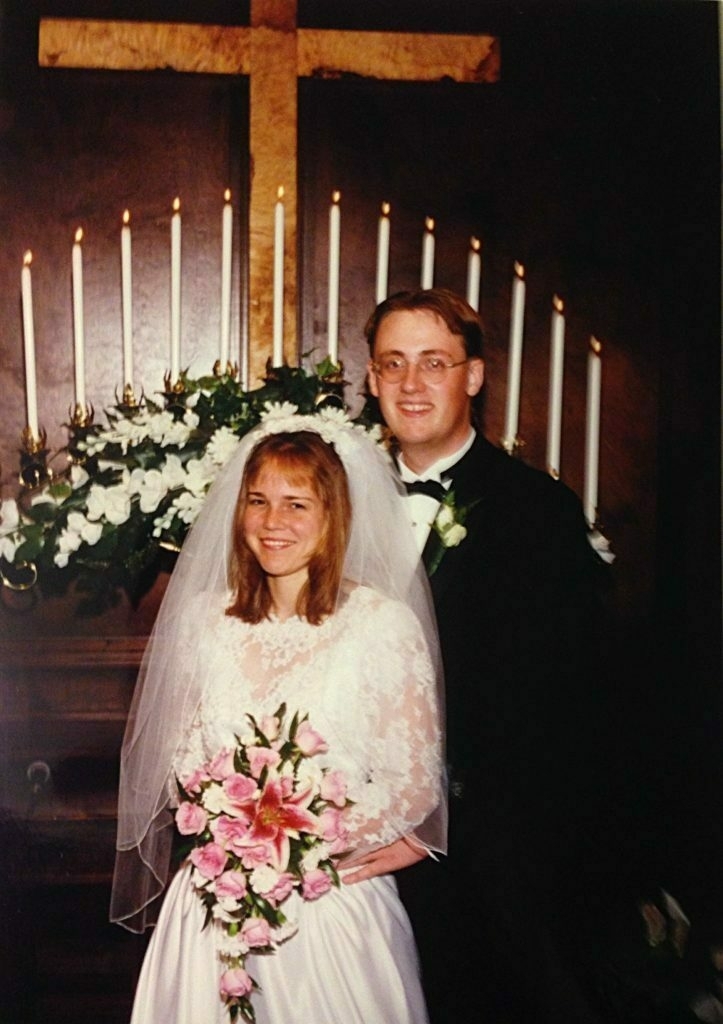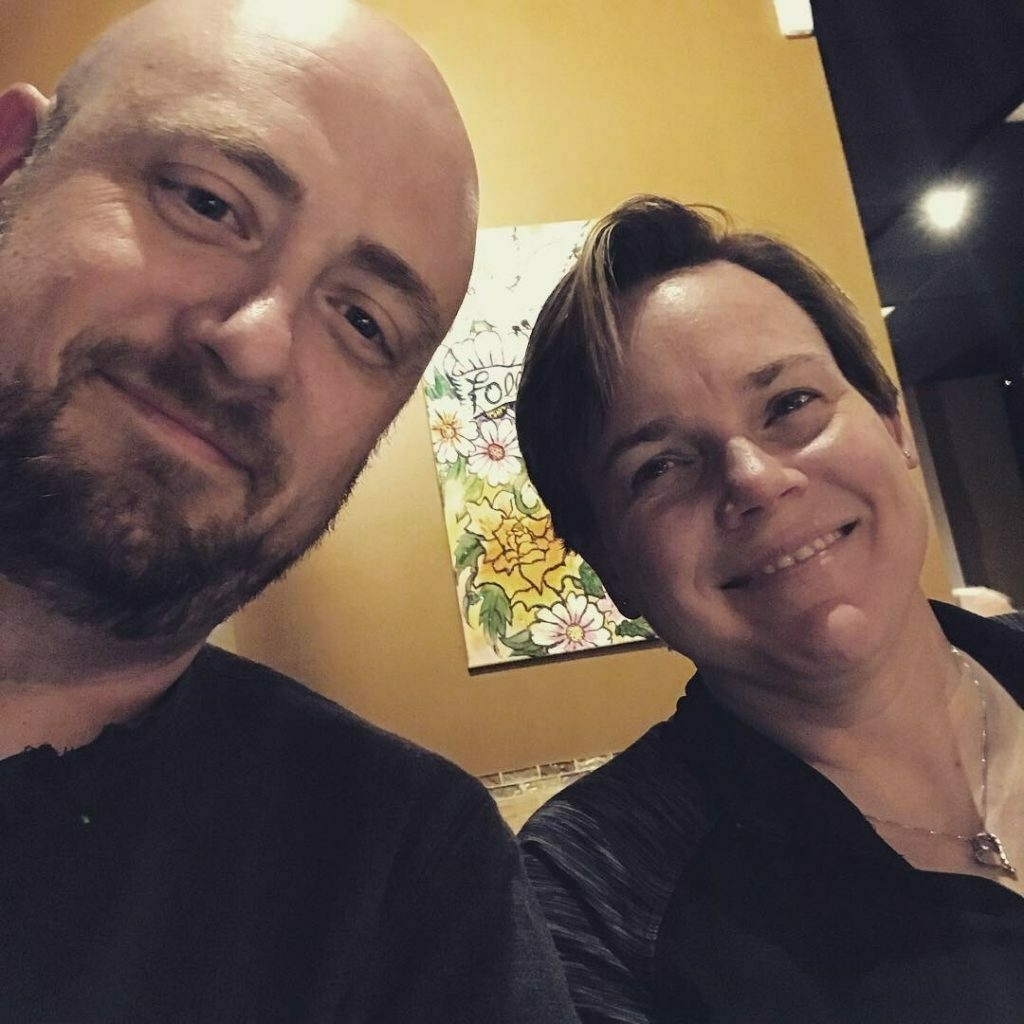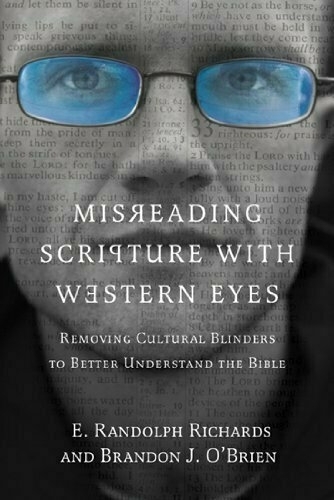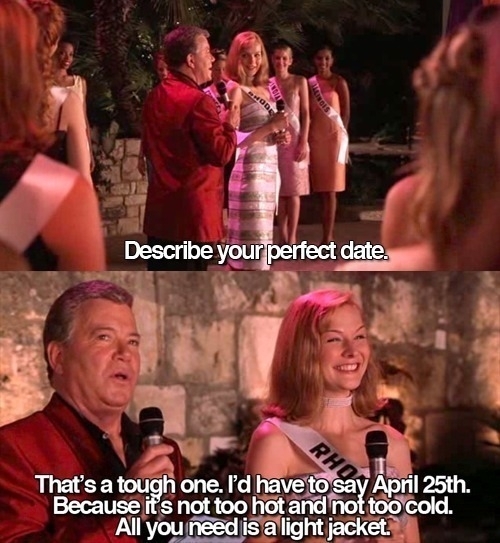Category: Longform
You are viewing all posts from this category, beginning with the most recent.
21 Years
I guess this is the point at which we can say we’ve been married half our lives…
Definitely the better half of mine.


Why *wouldn’t* you want to be an egalitarian?
In reply to a tweet thread the other day, I posed a question that’s been on my mind lately:
Update 2023: Twitter account is gone, but the tweet said something like: “given that Scripture could be interpreted either way, why wouldn’t you want to be an egalitarian?
The responses to my tweet asked and presumed that this was a rhetorical question. And while it could sound that way, I didn’t really intend it that way, and I’d like to toss the question around a little bit more. Because I know and love and worship with a bunch of complementarians, and it would be uncharitable and unrealistic to presume that those who hold complementarian views do so for bad reasons.
Now, I’ve given away my own position with the question. I think there’s more than just room for the egalitarian position - I have come to see it as the position that most fully magnifies Christ’s work of reconciliation and restoration. In addition, fully embracing women serving in any role to which God has gifted them, including leadership roles, brings many practical benefits to the church. So if scripturally we could go either way, and the result is beneficial, why wouldn’t we go that route?
I suspect most of my evangelical complementarian friends would start from a different premise. While I would favor a Wesleyan interpretative framework that incorporates reason and experience along with Scripture and tradition, they would lean exclusively on Scripture. Then they would say that the clear position from Scripture is complementarian. And that would basically be that. And while some of the hard line complementarians would elevate it to a gospel-level issue - Denny Burk saying that the “egalitarian hermeneutic has the potential to undermine… the gospel itself” - most of the complementarians I personally know would acknowledge it as a secondary issue.
I’ve seen enough bad behavior online the past days (weeks, months, years) to believe that there is some subset of complementarians who are by their actions revealing that they are motivated by power and control more than by a particular Scripture hermeneutic. But I think it’s worth saying plainly that I don’t believe that’s common to all complementarians.
I have recently really benefitted from Bruxy Cavey’s teaching on egalitarianism from an Anabaptist perspective. But even further than that I appreciate and want to adopt his attitude that those who disagree with my egalitarian views are still my dearly beloved brothers and sisters in Christ. I just believe they’re wrong on this issue!
2019 Reading, Compendium #2
Trying to not get my book lists get so backed up this time. Here’s what I’ve been reading recently:
Golden State by Ben H. Winters
This one underwhelmed me a bit - interesting concept of a society where everything is logged and speaking falsehood is against the law, but execution wasn’t so interesting.
Mission Critical by Mark Greaney
Sometimes you just need a spy thriller. But maybe not this spy thriller.
O Pioneers! by Willa Cather
I’ve never read Cather’s novels before, and felt some midwestern hankering for Nebraska-based writing. Now I need to get through the other two in the trilogy.

Misreading Scripture with Western Eyes: Removing Cultural Blinders to Better Understand the Bible by E. Randolph Richards and Brandon J. O’Brien
Richards and O’Brien are trying to help us understand that some of the texts that we so easily read and interpret through a 21st century American framework can have some significantly different meanings when seen through the cultural framework of the original audience. Worth a read, though not quite as earth-shattering as some of the reviews had led me to believe.
The Immortal Life of Henrietta Lacks by Rebecca Skloot
Henrietta Lacks was an African American woman whose cells were taken as a medical sample when she was in the hospital for cancer treatment. Those cells proved remarkably resilient and have become the base cell samples for medical experiments around the world to this day. Henrietta’s story itself is a rather slim part of the book; it revolves far more around race and poverty and its impact on the family she left behind.
Talent by Juliet Lapidos
This was a random selection from the library shelf that didn’t live up to its blurbs. Claimed to be a “deliciously funny” novel grappling with the source of creative inspiration and talent. Meh.

This Life or the Next by Demian Vitanza
A novel written as a first-person account of a Pakistani Muslim immigrant to Norway who went to fight with ISIS in Syria. Fiction, but based on accounts given to the author by a man currently serving time in a Norwegian prison for terrorism. Challenging to see an “enemy” through his own eyes.
A Song for Nagasaki: The Story of Takashi Nagai: Scientist, Convert, and Survivor of the Atomic Bomb by Paul Glynn
Biography, faith story, and harrowing account of surviving the Nagasaki atomic bombing all rolled into one. Really enjoyed this book. Planning to pass it along to my high school daughter to read.
The Radium Girls: The Dark Story of America’s Shining Women by Kate Moore
An account of an early workplace safety issue and court case where young women worked painting radium onto watches to make the faces luminescent. It’s an unsurprising story in most ways: a workplace hazard that, once understood by the corporation, was denied and covered up in order to maintain profits. The continual and vivid descriptions of the horrible effects of radium poisoning on these women’s bodies may have felt necessary to the author to raise the stakes of the story, but they were so vivid and plentiful that I just about put the book down because I could take any more talk of rotting jawbones and gushing pus.
And just so the last words in my blog post aren’t “gushing pus”, let me note that I’m still working on Rebecca West’s Black Lamb and Grey Falcon. It’s just gonna take me a while.
These Democrats Should Run for Senate instead of President in 2020
With today’s announcement by Montana governor Steve Bullock that he is throwing his hat in the ring for the 2020 Democratic presidential nomination, we now have 23 nationally recognized candidates running. With the field wide open and a troubled incumbent, this is to an extent understandable.
However, (and I’m by no means the first to observe this,) if the Democrats want to make lasting changes to the direction Trump and McConnell have taken the country since 2016, they need not only the White House - they need a Senate majority. So, here’s my run-down of the current presidential candidates and where I think they should be running for Senate instead. (Candidates listed alphabetically, direct from the relevant Wikipedia article.)
Michael Bennet - Bennet is currently a Democratic senator from Colorado, and his term doesn’t expire until 2022. He isn’t hurting the Dems’ chances at the Senate by running.
Joe Biden - While Biden had a long and distinguished career in the Senate, he’s not likely to run again after serving as VP for two terms. And Delaware’s two senators are already Democrats. Joe can stay in.
Cory Booker - Booker’s Senate term is up in 2020. Somebody’s gonna have to fill that hole. My 10-second Google search didn’t turn up anybody announced yet to run to fill his spot, but New Jersey is a fairly safe state for Democrats, seeing as they keep re-electing even the highly corrupt Bob Menendez.
Steve Bullock - Bullock is touting his ability to have won statewide office in a majority Republican state as a qualification for his presidential campaign. But Montana has a Republican senator up for re-election in 2020, and if Bullock really has such skills, he should turn them toward defeating Steve Daines to turn the second Montana Senate seat blue.
Pete Buttigieg - Mayor Pete might be at some point a worthy Democratic Senate candidate from Indiana. However, Indiana doesn’t have a Senate seat up in 2020. Mayor Pete can keep running. He might make somebody a good Vice President.
Julián Castro - Castro would need to do a little bit of coordinating here with Beto O’Rourke. Both are from Texas, and Texas has a Senate seat up in 2020. O’Rourke almost knocked off Ted Cruz in 2018; Castro could surely put up a strong state-wide campaign if he took up the torch. One of these guys should be challenging John Cornyn next year.
John Delaney - Who is this guy again? Maryland already has two Democratic senators and neither are up for re-election in 2020. Delaney is welcome to keep tilting at windmills as long as his funding holds out.
Tulsi Gabbard - In pretty much the same spot as Delaney. She’s not going to challenge one of Hawaii’s existing Democratic senators, so why not run for President?
Kirsten Gillibrand - Gillibrand is already a Senator and just got re-elected in 2018. If she doesn’t take the White House, she’ll stay in the Capitol. No impact.
Mike Gravel - LOL.
Kamala Harris - Harris has two years left on her term in the Senate, so she’s safe either way.
John Hickenlooper - Here’s another guy who should reconsider. Cory Gardner (who I always seem to get confused with Cory Booker for some reason) is up for re-election in 2020. Hickenlooper has been popular as a governor in Colorado. If he could oust Gardner that’d turn another Senate seat blue. It’d be worth a shot.
Jay Inslee - Inslee is currently Governor of Washington, a state that already has two Democratic senators. No harm in him running.
Amy Klobuchar - Klobuchar just won re-election to the Senate in 2018 so she’s safe either way. Fortunately for her it’s almost done snowing in Minnesota for the season, so her campaigning will get a little bit easier.
Wayne Messam - If you’re saying “who is that again?”, a reminder that Messam is currently the mayor of Miramar, Florida. Which, to be fair I guess, is about the same size as South Bend, Indiana. Florida doesn’t have any Senate seats up in 2020, though.
Seth Moulton - I had to look this guy up to remember who he is. (He’s a member of the House from Massachusetts.) Ed Markey is up for re-election in Massachusetts but surely he’ll run again, so Moulton is left out in the cold.
Beto O’Rourke - As I wrote above, he’s gotta get w/ Julián Castro and figure out which one of them is gonna take out John Cornyn.
Tim Ryan - No Senate seats open in Ohio in 2020, so Ryan can be another nondescript white Midwestern guy running for President.
Bernie Sanders - Bernie just won re-election in 2018. His seat is safe until old age catches up with him.
Eric Swalwell - Again, who? Another non-descript Midwestern boy (he was born in Iowa, even if he’s currently a Californian) who doesn’t have a Senate seat to run for.
Elizabeth Warren - Just won re-election in Massachusetts in 2018.
Marianne Williamson - LOL. (From California. See Swalwell above.)
Andrew Yang - Also LOL. From New York. Not gonna challenge Schumer or Gillibrand even if they were up in 2020.
So, let’s review.
Which Democrats should run for Senate instead of President? Bullock in Montana. Castro or O’Rourke in Texas. Hickenlooper in Colorado. Then Stacey Abrams should challenge Perdue in Georgia.
Then we need a strong Democrat to run against Joni Ernst in Iowa, but the Iowa Democrats haven’t managed to field a strong candidate for anything in a while. (J. D. Scholten might have a better luck running state-wide against Ernst than he did running against Steve King for the House…)
And can North Carolina get enough voting rights back to unseat Thom Tillis? They get to undo some gerrymanders but that won’t affect a statewide race like the Senate.
In short: there are some opportunities for Democrats to make gains and possibly take an outright majority in the Senate in 2020. But they need to spend their energy running for those seats instead of having all their strong candidates running in a giant knock-out race for President. If 2020 is really about our Republic’s survival after four years of Trump and McConnell destroying all governing norms, Democrats need to treat it that way and make a cooperative concerted effort to win both the White House and the Senate.
At least a guy can dream, right?
DBH: Can we relax about "socialism"?
David Bentley Hart reworks his Facebook post from last year (which I posted about at the time) into a New York Times opinion piece. It’s still sharp and incisive in all the best ways. A snippet or two:
I have lived abroad often enough to be conscious of the flaws in various nations’ social democratic systems. But I know too that those systems usually make possible something closer to a just and charitable society than ours has ever been.
One need not idealize any of these nations or ignore the ways in which they differ in balancing public and private financing of civic services. But all of them are, broadly speaking, places where — without any unsustainable burden on the national economy — the cost of health care per capita is far lower than it is here and yet coverage is universal, where life spans are longer, where working people are not made destitute by serious illnesses, where a choice between food or pharmaceuticals need never be made, where the poor cannot be denied treatments by insurance adjusters, where pre-existing health conditions could never be denied coverage, where most people have far more savings and much lower levels of debt than is the case here, where very few families live only a paycheck away from total poverty, where wages generally keep pace with inflation, where every worker has decent vacation time each year, where suicide and opioid addiction are not the default lifestyle of the working poor, where homelessness is exceedingly rare, where retirement care is humane and comprehensive and where the schools are immeasurably better than ours are.
Americans, however, recoil in horror from these intolerable impositions on personal liberty.
Brutal.
Finished reading, an early 2019 compendium
Maybe I’ll start posting these every time again… but for now I’ve got a long-ish list of books I’ve finished already this year. Particular standouts are in bold. Here goes nothin':
All That’s Good: Recovering the Lost Art of Discernment by Hannah Anderson
Fruit of the Drunken Tree by Ingrid Rojas Contreras
Empires of the Word: A Language History of the World by Nicholas Ostler
Virgil Wander by Leif Enger

The Color of Compromise: The Truth About the American Church’s Complicity in Racism by Jemar TisbyTisby carefully and methodically lays out the complicity and often encouragement that the American church gave to personal and institutional racism. A painful but needed reminder that we have a long way to go and a lot to make right.
The Killer Collective by Barry Eisler
Becoming the Gospel: Paul, Participation, and Mission by Michael J. Gorman
Christianity: The First Three Thousand Years by Diarmaid MacCulloch
The Feral Detective by Jonathan Lethem
We Need Each Other: Responding to God’s Call to Live Together by Jean VanierVanier is a Catholic humanitarian who founded a federation of communities dedicated to caring for people with developmental disabilities. I’ve heard and watched a couple interviews with Vanier and his holiness and humility are immediately evident in a way that’s incredibly rare. (His On Being interview with Krista Tippett is a great one.)His book is similarly humble and holy.
Radical Technologies: The Design of Everyday Life by Adam Greenfield
My Traitor’s Heart: A South African Exile Returns to Face His Country, His Tribe, and His Conscience by Rian MalanWritten prior to the end of apartheid in South Africa, Malan, a white South African journalist, tries to come to grips with the system of white supremacy that to him seems both wicked and unchangeable.
Rogue Lawyer by John Grisham
The Text of the Old Testament: An Introduction to the Biblical Hebraica by Ernst Wurthwein
Reconstructing the Gospel: Finding Freedom from Slaveholder Religion by Jonathan Wilson-Hartgrove
Benefit of the Doubt: Breaking the Idol of Certainty by Gregory A. BoydBoyd makes the case that doubt can enhance faith, and that at times the need for certainty can be more damaging than helpful. I’m right there with him on that one.
Paul: A Biography by N. T. Wright
A Prayer for Owen Meany by John Irving
Hyperion by Dan SimmonsAward-winning science fiction. Imaginative in a way that only the best sci-fi is.
Zoo Nebraska: The Dismantling of an American Dream by Carson Vaughan

Why Should the Devil Have All the Good Music?: Larry Norman and the Perils of Christian Rock by Gregory Alan ThornburyA well-written and -researched biography of one of the truly fascinating characters of early contemporary Christian music.
All You Can Ever Know: A Memoir by Nicole Chung
Flee, Be Silent, Pray: An Anxious Evangelical Finds Peace with God through Contemplative Prayer by Ed Cyzewski
Cyzewski makes the case for contemplative prayer being not just helpful but necessary, and makes it sound easy enough that even this long-time evangelical feels like I should take up the practice.
At the moment I’ve got another long one going: Rebecca West’s Black Lamb and Grey Falcon. (1200 pages!)
Richard Beck: In defense of heretics
I really appreciated this from Richard Beck today:
People don’t just wake up one day to suddenly and brazenly espouse a heresy. In my experience, you end up a heretic because there’s a gnawing theological issue that’s keeping you up at night. The burden and size of this issue often grows and grows until a lack of progress in its resolution becomes intellectually and emotionally intolerable…
…many people at this point do something very heroic and commendable. They become heretics.
It’s heroic and commendable because faith isn’t being jettisoned. A herculean effort is made to keep and secure faith. Sure, the price is believing in some rather contested, controversial stuff, but the win is keeping you in the orbit of God, the Bible, and the church.
All that to say, heresy might be wrong, but it can be awfully therapeutic. The mind settles and the heart calms and you can get on with the real business of following Jesus in your day to day life. Some people just need to believe in weird, quirky stuff to make the puzzle fit together.
Beck’s reasoning has validity, too, when it comes to beliefs that aren’t heresy but that are outside the theological mainstream of whatever community you’re in.
Our salvation is blessedly not on the basis of mentally embracing exactly perfect doctrine. I’m comfortable, as I think Beck is here, to trust that God knows the hearts and desires of those people seeking Him, and that if He sees it needful to bring my heart around to embrace some belief that I just can’t stomach today, He can do that.
As Beck says at the end of his piece, “a little bit of empathy, understanding and compassion around these issues would do everyone a great deal of good.” Amen.
I know nothing about this movie other than what’s in this trailer...
But I would buy a ticket right this minute if I could.
Opening Day 2019
It’s been a long winter. Heck, it’s been a long week. Which makes today a particularly happy one: it’s opening day for Major League Baseball. (OK, the Mariners and A’s played two games in Japan a week ago that were officially regular season games, but today is the real opening day.)

I’ve enjoyed baseball since I was a kid, having spent many hours as a teenager listening to the Texas Rangers on the radio. Upon moving to Iowa after college I fell in with a bunch of Chicago Cubs fans and have followed them ever since. We took the kids to Wrigley Field last fall for the first time, and I have some kid-made Cubs fan art hanging in my office that dates back to Game 7 of the 2016 World Series. I won’t be free to sit and watch the Opening Day game with them today - darn workday afternoon games! - but I’m doing my best to pass a love of the game on to the next generation.
Play ball! Oh, and: Go Cubs, Go!
